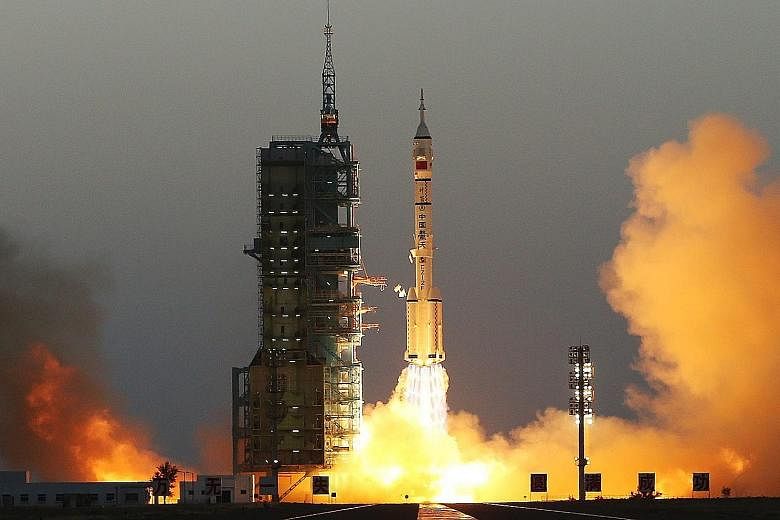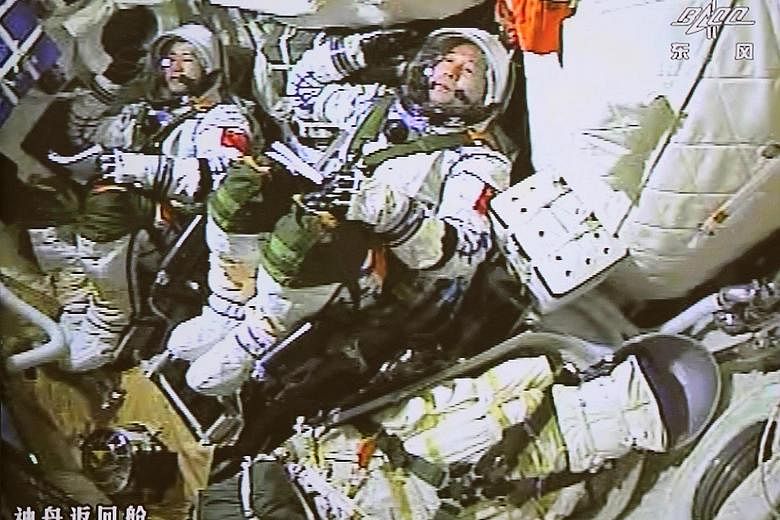China has launched its longest space mission, with a two-man crew expected to spend 33 days in outer space that will see them conducting experiments such as growing lettuce and raising silkworms.
The crew's most important task is to practise techniques and conduct tests on systems that will pave the way for the country to launch its first space station by 2022.
China took an important step in its march into space when the Shenzhou-11 spacecraft lifted off yesterday at 7.30am from the Jiuquan Satellite Launch Centre in the Gobi desert in north-west China on a Long March-2F carrier rocket.
Aboard China's sixth human space flight mission since 2003 - which produced the country's first astronaut Yang Liwei - are commander Jing Haipeng, who will mark his 50th birthday during what is his third space mission, and rookie flight engineer Chen Dong, 37.
Out of the 33 days of the mission, they will spend 30 days inside a space laboratory module, doubling the current record of 15 days set by the Shenzhou-10 mission in 2013.

The duo will perform medical and space science experiments, as well as system tests, on the Tiangong-2 module launched last month.
They will also undergo ultrasound tests during space travel for the first time, cultivate plants, and test experiments designed by winners of a competition in Hong Kong for secondary school students.
-
US$13 b China's annual budget for space exploration, second to the United States, which spends US$40 billion a year
Shenzhou-11, scheduled to complete a docking tomorrow with the Tiangong-2 module, is dubbed as China's last manned mission before the country completes construction of its first space station by 2022.
If this is achieved, China will become the only country with such a facility in service after the United States-dominated International Space Station retires by 2024.
In a message delivered on his behalf at the launch site, President Xi Jinping said the mission will "enable China to take larger and further steps in space exploration, and make new contributions to building up China as a space power".
Mr Xi was in India attending the eighth summit of the Brics bloc comprising Brazil, Russia, India, China and South Africa. Premier Li Keqiang and fifth-ranked leader Liu Yunshan watched a live broadcast of the launch at the command centre of China's manned space programme in Beijing.
Ms Huang Weifen, deputy chief designer of the astronaut system, said the Shenzhou-11 mission will offer "a precious opportunity to verify the technology needed to support astronauts' life, health and work, as well as to gather data for the space station mission".
The Xinhua news agency reported that the astronauts will have access to almost 100 kinds of food, and contact with Earth through video, audio and e-mail.
Ms Wu Ping, deputy director of China's manned space engineering office, said the mission will also allow medical researchers to study how the two-man crew respond to microgravity after a month in orbit.
Driven largely by a desire to project its growing international power and to boost nationalistic sentiments, China has been investing heavily in its space programme over the recent decades. China also plans to send an unmanned rover to Mars in 2020 and the first Chinese astronaut to the moon by 2025.
While China's endeavours are lagging in decades behind those of the US and Europe, some analysts point out that the aspiring space power has the "latecomer's advantage" as it is able to tap the latest technologies for its breakthroughs.


